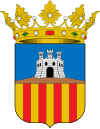Province of Castelló
|
Castelló Castelló/Castellón |
||
|---|---|---|
| Province | ||
|
||
 Map of Spain with Castelló highlighted |
||
| Coordinates: 40°10′N 0°10′W / 40.167°N 0.167°WCoordinates: 40°10′N 0°10′W / 40.167°N 0.167°W | ||
| Country | Spain | |
| Autonomous community | Valencian Community | |
| Capital | Castellón de la Plana | |
| Government | ||
| • President | Javier Moliner Gargallo (PPCV) | |
| Area | ||
| • Total | 6,679 km2 (2,579 sq mi) | |
| Area rank | Ranked 38th | |
| Population (2014) | ||
| • Total | 587,508 | |
| • Rank | Ranked 28th | |
| • Density | 88/km2 (230/sq mi) | |
| Demonym(s) | Castellonense | |
| Official language(s) | Valencian and Spanish | |
| Parliament | Cortes Generales | |
| Website | Provincial website | |
Castellón (Spanish: [kasteˈʎon]) or Castelló (Valencian: [kasteˈʎo]) is a province in the northern part of the Valencian Community, Spain. It is bordered by the provinces of Valencia to the south, Teruel to the west, Tarragona to the north, and by the Mediterranean Sea to the east. The western side of the province is in the mountainous Sistema Ibérico area.
Castellón's capital is Castellón de la Plana (Valencian: Castelló de la Plana). The province had a population of 501,237 in 2002, 30% of whom were residing in the capital, 60% in its metropolitan area, and 85% along the coastline. As of 2012, the population had since grown to 604,564 people. The province, and in particular its idle large airport, has become a symbol of the wasteful spending and corruption prior to the Spanish financial crisis.
It is a bilingual territory, with many inhabitants speaking both Spanish and the local, co-official language of Valencian. Spanish and Catalan are closely related and understandable to a fair degree Catalan. There are marked distinctions in vocabulary and grammar which puts Catalan closer to Occitan in southern France and would make it difficult for a monolingual speaker of Spanish to understand. Usage is a source of some controversy and political but not to the degree as in Catalonia where the upper classes preferred Catalan to Spanish and thus preserved the vitality of the language in the national consciousness of the majority of the people there.
...
Wikipedia

